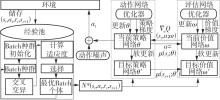| 1 |
盛万兴,吴鸣,季宇,等 .分布式可再生能源发电集群并网消纳关键技术及工程实践[J].中国电机工程学报,2019,39(8):2175-2186,S1.
|
|
SHENG Wanxing, WU Ming, JI Yu,et al .Key techniques and engineering practice of distributed renewable generation clusters integration[J].Proceedings of the CSEE,2019,39(8):2175-2186,S1.
|
| 2 |
梁志峰,叶畅,刘子文,等 .分布式能源集群并网调控:体系架构与关键技术[J].电网技术,2021,45(10):3791-3802.
|
|
LIANG Zhifeng, YE Chang, LIU Ziwen,et al .Grid-connected scheduling and control of distributed generations clusters:architecture and key technologies[J].Power System Technology,2021,45(10):3791-3802.
|
| 3 |
张明,朴政国 .含储能的分布式光伏并网系统对配电网调峰的研究[J].电气技术,2016(12):11-14,19.
|
|
ZHANG Ming, PIAO Zhengguo .Research of distribution network peak shaving for distributed grid-connected PV system with energy storage device[J].Electrical Engineering,2016(12):11-14,19.
|
| 4 |
郝晓弘,杨婧元 .基于灰色PSO算法的分布式电网多目标调峰调度优化[J].兰州理工大学学报,2018,44(6):79-83.
|
|
HAO Xiao-hong, YANG Jing-yuan .Grey PSO algorithm-based multi-objective optimization of scheduling of distri-buted power grid with peak load regulation[J].Journal of Lanzhou University of Technology,2018,44(6):79-83.
|
| 5 |
李世彦 .面向电网调峰的综合能源系统弹性模型及调度优化方法[D].合肥:合肥工业大学,2022.
|
| 6 |
董璐,边晓燕,周波,等 .计及调频备用效益的主动配电网分层分布式协调优化调度[J].电力自动化设备,2023,43(1):55-63.
|
|
DONG Lu, BIAN Xiaoyan, ZHOU Bo,et al .Hierarchical distributed coordinated optimal dispatch of active distribution network considering frequency regulation reserve benefits[J].Electric Power Automation Equipment,2023,43(1):55-63.
|
| 7 |
陈楚靓,李晓露,纪坤华,等 .考虑源荷储匹配的配电网集群划分与优化运行[J].电力建设,2023,44(9):80-93.
|
|
CHEN Chujing, LI Xiaolu, JI Kunhua,et al .Distribution network cluster partition and optimal operation consi-dering source-load-storage matching[J].Electric Power Construction,2023,44(9):80-93.
|
| 8 |
陈宁,李法社,王霜,等 .基于深度强化学习算法的分布式光伏-EV互补系统智能调度[J/OL]. (2024-04-16)[2024-04-28]..
|
|
CHEN Ning, LI Fashe, WANG Shuang,et al .Intelligent scheduling of distributed photovoltaic EV complementary systems based on deep reinforeement learning algorithm[J/OL]. (2024-04-16)[2024-04-28]..
|
| 9 |
蒋明喆,成贵学,赵晋斌 .基于改进DDPG的多能园区典型日调度研究[J].电网技术,2022,46(5):1867-1880.
|
|
JIANG Mingzhe, CHENG Guixue, ZHAO Jinbin .Typical daily scheduling if improved DDPG multifunctional industrial park[J].Power System Technology,2022,46(5):1867-1880.
|
| 10 |
徐钰涵,季天瑶,李梦诗 .基于深度强化学习的微电网日前日内协调优化调度[J].南方电网技术,2024,18(9):106-116.
|
|
XU Yuhan, JI Tianyao, LI Mengshi .Day-ahead and intra-day coordinated optimal scheduling of microgrid based on deep reinforcement learning[J].Southern Power System Technology,2024,18(9):106-116.
|
| 11 |
吕帅,龚晓宇,张正昊,等 .结合进化算法的深度强化学习方法研究综述[J].计算机学报,2022,45(7):1478-1499.
|
|
Shuai LÜ, GONG Xiaoyu, ZHANG Zhenghao,et al .Survey of deep reinforcement learning methods with evolutionary algorithms[J].Chinese Journal of Computers,2022,45(7):1478-1499.
|
| 12 |
蒋正威,张锋明,胡凤桐,等 .虚拟电厂分布式资源的聚合响应能力评估方法[J].电力工程技术,2022,41(6):39-49.
|
|
JIANG Zhengwei, ZHANG Fengming, HU Fengtong,et al .Evaluation method of aggregated responsiveness of distribute resources in virtual power plant[J].Electric Power Engineering Technology,2022,41(6):39-49.
|
| 13 |
LILLICRP T P, HUNT J J, PRITZEL A,et al .Continuous control with deep reinforcement learning[C]∥ Proceedings of 4th International Conference on Learning Representation.San Juan: ICLR,2016:1-14.
|
| 14 |
HOU Y, LIU L, WEI Q,et al .A novel DDPG method with prioritized experience replay[C]∥ Proceedings of IEEE International Conference on Systems, Man, and Cybernetics (SMC). Banff:IEEE, 2017:316-321.
|
| 15 |
KANG C, RONG C, REN W,et al .Deep deterministic policy gradient based on double network prioritized experience replay[J].IEEE Access,2021,9:60296-60308.
|



















